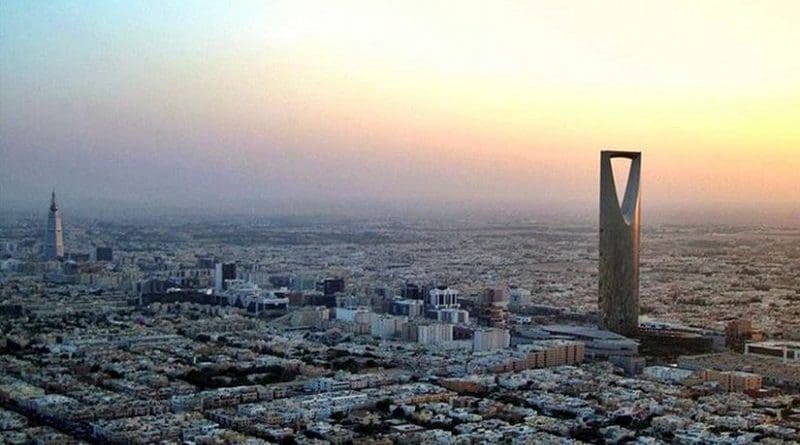Missile Fired At Saudi Capital Was Iranian, US Official Says
By Arab News
By Siraj Wahab
Iran manufactured the ballistic missile fired by Yemen’s Houthi militia toward the Saudi capital and remnants of it bore “Iranian markings,” the top US Air Force official in the Middle East said on Friday.
“There have been Iranian markings on those missiles… To me, that connects the dots to Iran,” said Lt. Gen. Jeffrey L. Harrigian, who oversees the Air Force’s Central Command in Qatar.
“How they got it there is probably something that will continue to be investigated over time,” he said. “What has been demonstrated based on the findings of that missile is that it had Iranian markings on it. That in itself provides evidence of where it came from.”
The missile was shot down on Nov. 4 near Riyadh’s international airport. Saudi investigators examining the remains of the rocket found evidence proving “the role of the Iranian regime in manufacturing them.”
French President Emmanuel Macron also described the missile as “obviously” Iranian.
He said that he was “very concerned” by Iran’s ballistic missile program, and raised the prospect of possible sanctions.
“There are extremely strong concerns about Iran. There are negotiations we need to start on Iran’s ballistic missiles,” he said.
Nikki Haley, the US ambassador to the UN, said in a statement on Tuesday that a missile launch in July involved an Iranian Qiam-1, a liquid-fueled, short-range Scud missile variant.
Iran used a Qiam-1 in combat for the first time in June when it targeted Daesh militants in Syria over militant attacks in Tehran.
US warships have also been attacked by the Houthis. In October 2016, the US Navy said that the USS Mason came under fire from two missiles launched from Yemen. Neither reached the warship, though the US retaliated with Tomahawk cruise missile strikes on three coastal radar sites in Houthi-controlled territory on Yemen’s Red Sea coast.
At the time, authorities said the missiles used in that attack were Silkworm missile variants, a type of coastal defense cruise missile that Iran has been known to use.
Dr. Hamdan Al-Shehri, a Riyadh-based Saudi political analyst and international relations scholar, said that Lt. Gen. Harrigian’s comments supported Saudi Arabia’s case against Iran.
“This confirms what Saudi Arabia has stated,” he told Arab News. “This conclusively proves Iranian intervention in the region. Iran is using its deadly arsenal through the Houthis and Hezbollah.”
He said the statement was “a big indication” that the US shares the Saudi concern and was ready to back Saudi steps against Iran.
“Iran is exposed. The missile attack on Riyadh will not go unpunished. Saudi Arabia will take serious measures against Iran,” he said.
Harvard scholar and Iranian affairs expert Majid Rafizadeh said Lt. Gen. Harrigian’s statement is significant because a high-level official is confirming what many experts and policy analysts have said, which is that the Iranian regime was behind the attack against Saudi Arabia.
“It re-confirms the Iranian regime’s continuing belligerent behavior in the region, its pursuit for regional hegemony and its deep antagonism toward Saudi Arabia,” Rafizadeh told Arab News. “It shows that Saudi Arabia has never made allegations against the Iranian regime without proof and evidence.”
According to Rafizadeh, the Iranian regime’s involvement and cooperation with the Houthis “is much deeper than what the public generally knows.”
He said Tehran provides sophisticated training for conducting terror attacks, and that it arms and funds the Houthis on a much higher level.
Oubai Shahbandar, a Syrian-American analyst and fellow at the New America Foundation’s International Security Program, said: “The Iranian Revolutionary Guards have been caught red-handed.
“For any skeptic that still denies the Houthis are a direct proxy of the Iranian government, keep in mind that the transfer and launch of such a sophisticated missile against the Saudi capital would not have been possible without the approval at the highest levels in Tehran.
“What this means is that there are likely Iranian Revolutionary guard officers or possibly Lebanese Hezbollah operatives on the ground embedded with the Houthi militias to help facilitate the movement of these missiles and the targeting process.”
Shahbandar wondered what the reaction would be if Riyadh had authorized a missile strike against Tehran.
“There would have been international uproar. Iran’s signature was literally discovered on the missile itself. It’s a dangerous escalation and it is important to publicly call out Iran for its direct involvement in the missile strike without any equivocation,” Shahbandar said.


And thousands of American missiles have been fired into Yemen, Syria, Lybia and Palestine killing hundreds of thousands children, women and men.
Please comment, thanks.